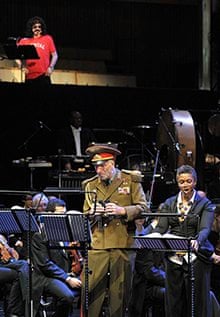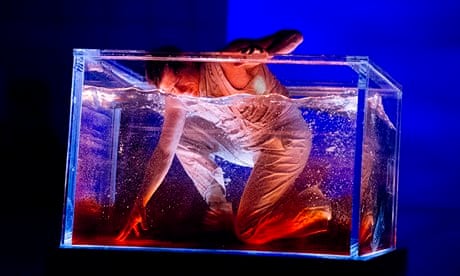The potency of Alban Berg's Wozzeck lies, in part, in the forging of opposing energies: naturalism and expressionism. The simple story of an impoverished soldier, bullied by his masters and driven to murdering his lover, is immediate in impact. Already fragmented in its original, incomplete telling by Georg Büchner (1813-37), Berg reduced it to a mere 15 scenes, keeping the plot clear but doubling the sense of alienation with music which ranges from the abrasive and dissonant to the visceral and suddenly sensuous.
Keith Warner's 2002 staging, revived for the second time at the Royal Opera House, adds a triple layer of separation by shattering the clarity of the narrative. Stefanos Lazaridis's grubby, white-tiled lab, complete with the paraphernalia of human and animal experiment, presents handsome stage images (if you fancy that sort of thing) but mutes the vital naturalism of the story. I remember finding the production hard to follow when new. It remains so.
Given that Wozzeck was the first opera I ever saw – an unlikely hook for a lifelong passion, and as far from the Nessun Dorma style as any opera can be – this was baffling. Its unflinching truths, as well as the atonal score, have remained alive in me ever since, and I thought I knew the text pretty well too. In Warner's staging you sense, powerfully, the moral turpitude at the plot's core, but somehow the scenes with the Captain, Doctor, Drum Major – incisively and chillingly taken by Gerhard Siegel, John Tomlinson and Endrik Wottrich – seemed confused, the inevitability of Wozzeck's capitulation to these overlords never fully brought out.
The cast, however, was stunning, led by Simon Keenlyside as Wozzeck and Karita Mattila singing her first Marie, he innocent, dogged but fervent, she blowsy, longing for forgiveness yet hopeless. Mark Elder drove the score to some ferocious climaxes, with the two massive, sustained fortissimo chords which burst out of the orchestra toward the end so raw and nerve-racking as to set your teeth on edge. More give in the lyrical moments would ensure a yet richer performance and the added patina that gives this many layered work its enigmatic magic. Hear it on Radio 3 on 2 December.
The maverick happening of the week, lacking only spliffs and the requisite bowlfuls of well-chewed yin and yang, was the first UK staging of Frank Zappa's 200 Motels – performed by an army of musicians including the BBC Concert Orchestra, Southbank Sinfonia and London Voices conducted by Jurjen Hempel. Two bonus cast members were the Observer's Jay Rayner, cast against type as Bad Conscience/Ginger, and Zappa's daughter, Diva, as Groupie 2.

A planned performance of this self-styled "surrealist documentary" at the Royal Albert Hall was banned in 1971 on grounds of indecency, and this staging carried an "adults only" health warning. Yet as with so many things that titivate the censors, the questionable elements felt puerile rather than especially penile, and the whole anarchic show, and its music, were far more interesting than the laboured sexy-dildo elements.
Zappa's own film version, also dating from 1971, makes heavy use of his group, the Mothers of Invention. Last week's event, under the umbrella of the Southbank's The Rest Is Noise festival, was chiefly orchestral, displaying Zappa (1940-93) as the serious composer. Despite a terrific electric guitar solo (by Leo Abrahams), which was the best music of the night, the onstage rock band took second place to the massed strings, brass, harp, bells, gongs, marimbas, piano, harpsichord, celeste, accordion, you name it.
As instructed by Zappa, the classical musicians wore standard formal attire but were enclosed in a ring of barbed wire – less exciting than that sounds but providing a certain sharpness to the zany atmosphere. "Overproduced and not what Zappa would have wanted," commented a well-informed man next to me in a Zappa T-shirt who could spot every addition and subtraction to the score but was still – I think – pleased to have heard it.
London Voices produced some plangent and ecstatic vocal colours which were a pleasure to hear. The score veered from jazz to big band to rock to tonal to atonal to Sibelius, Varèse, Stravinsky and Schnittke. It was never less than intriguing. The mix of Claron McFadden's thrilling coloratura soprano, a hippy-cowboy duo of Ian Shaw and Brendan Reilly, and Tony Guilfoyle droll as Zappa guaranteed good entertainment. Even if it wasn't what everyone wanted of their hero beyond the grave, the crowd cheered their thanks that at last, 42 years late, this work had come to life. It was enough to make you weep into your tie-dye.
Riccardo Chailly and the Leipzig Gewandhaus Orchestra, reviewed by Stephen Pritchard last week, concluded their Brahms residency at the Barbican on Wednesday. Leonidas Kovakos's rigorous, full-blooded account of the violin concerto may have captured the rest of the audience's imagination rather more than mine. Then the illustrious Gewandhaus gave a fresh, clean-edged performance of the Fourth Symphony. Warm yet analytical, avoiding the lush, thick Brahms style of a bygone era, these players made the weighty muscular, the familiar bracing. At the end of the concert, and of Brahms's symphonic oeuvre, Chailly and his orchestra bathed, deservedly, in the audience's prolonged applause. Surely even the most brutish Brahms refusenik – apparently and incomprehensibly they do exist – would have succumbed to playing of this order.
Star ratings (out of 5):
Wozzeck ★★★★
Frank Zappa's 200 Motels ★★★
Leipzig Gewandhaus/Chailly ★★★★

Comments (…)
Sign in or create your Guardian account to join the discussion